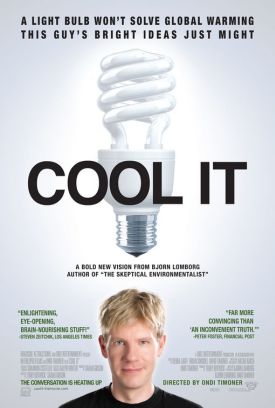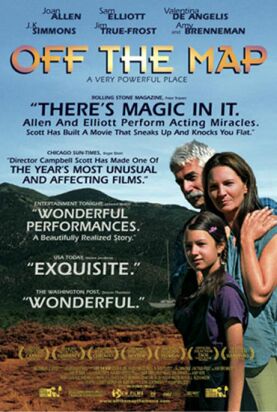Cool It
As I did with Davis Guggenheim’s recently-released Waiting for Superman, I found that Ondi Timoner’s Cool It tempted me to say that the movie is more revealing of the character and thought of the movie-going audience today than it is about its ostensible subject. That may be a bit of an overstatement, but not much. For both films are clearly designed to present to the hard core liberals and progressives who they (rightly) assume make up the overwhelming majority of those who will see or are ever likely to see them, what the film-makers hope will be the acceptable face of certain conservative ideas that otherwise they would never be willing to consider. Thus Mr Bj rn Lomborg, the hero of Cool It, believes devoutly, almost passionately in man-caused global-warming — even as he trashes both the Al Gore movie on the subject, An Inconvenient Truth, and the Al Gore approach to a remedy for global apocalypse through cap and trade legislation and other measures to reduce carbon emissions and wreck Western industrial economies.
That’s rather a lot for a liberal audience accustomed to idolizing Mr Gore to take on board. It is also the reason, as I take it, for occasional human interest passages and excursuses by Miss Timoner. In one such, Mr Lomborg engages in a bit of self-psychoanalysis by positing that he is not a victim, like Mr Gore, of global-warming hysteria because “I feel secure in the world; I know I am loved. That’s my mom.” And there then follows a heart-warming passage in which we see him visiting his mom, who has Alzheimer’s disease, in the home where he has deposited her and taking her, smiling for all she is worth, for a lovely outing on a bus. How bad can he be, this man who has been denounced by some of the world’s leading scientists as a charlatan or worse, if he loves his mother? He also rides a bike, has been a vegetarian since the age of 11 and green seemingly from birth — and (though the film doesn’t see the need to tell us so) is openly gay. Talk about reassuring your audience!
Yet this nerdy, personable, unthreatening Dane turns out to be an old-fashioned can-do American-style proponent of geo-engineering to offset the warming effects of greenhouse gases — such as painting the black surfaces of our urban “heat islands” white to reflect more sunlight than they absorb — and to protect coastal areas from rising sea levels by the use of dikes and tidal booms of the sort that have protected Holland from the sea for centuries. Moreover, he believes in dismissing the liberal fantasies of Kyoto and Copenhagen. One of the film’s few funny moments is played straight when we see President Obama addressing the Copenhagen conference, as useless as all the others, and sternly noting that it was time “not to talk but to act.” Mr Lomborg is also big on alternative energy sources, but his big idea is that we can take some of the money that would be thrown away on cap-and-trade and other futile schemes to limit carbon emissions and use it to deal with the world’s other big problems —such as providing clean drinking water and fighting HIV/Aids and malaria — where much smaller amounts of money would do fantastically more good.
One of the film’s interviewees puts the case against An Inconvenient Truth and the vast global-warming industry it and Nobel Peace prize-winning Al Gore have helped to spawn in a nutshell: “If you want to get people’s attention, you scare the pants off of them.” In Cool It, both at the beginning, over the opening credits, and during an extended passage later in the film, we see British school children, in response to Mr Lomborg’s questions, spouting the alarmist rubbish they have been taught in school, obviously frightened half out of their wits. These scenes are juxtaposed with ones in which he interviews some obviously less-pampered though not necessarily less-propagandized Kenyan school-children whose up-close and personal acquaintance with frightening realities — like poverty, hunger and disease — and not just fantasies has given them a rather different set of priorities.
The aim of most documentaries in the Michael Moore era has been, as it is with An Inconvenient Truth or, more recently, Inside Job, to inflame opinion against something or someone, to excite anger and fear, not to find anything out or learn something the audience didn’t know before. People who watch these docs seem only to wants to be told again what they already know, or else to told that the bad people they have already identified as such — corporate America, the Bush administration — have brought the world to the brink of destruction. Well, maybe liberal movie audiences are finally getting tired of being alternately stroked and frightened by partisan hacks with axes to grind. At one point, Mr Lomborg puts the starkest of questions to an audience of college students in the U.S., who may stand in for the liberals and other fantasists that will mostly make up the audience for his movie. Do you want to feel good — by largely meaningless gestures like driving a hybrid or using those new curly light-bulbs — or to do good? As one earnest young man is seen nodding at this reality check we may think to ourselves, as with Waiting for Superman, well, it’s not ideal, but it’s a start.
Discover more from James Bowman
Subscribe to get the latest posts to your email.






